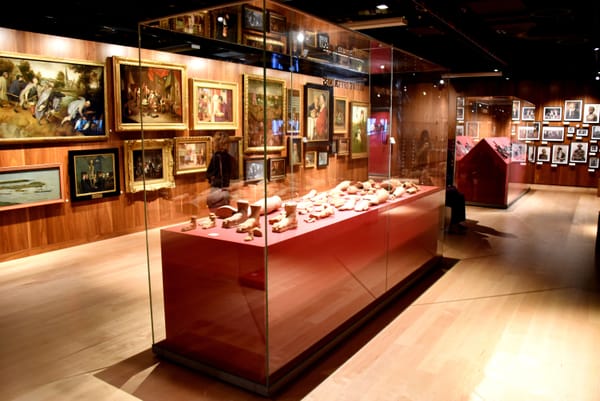In early November, Netflix began streaming the docuseries Ancient Apocalypse, in which the British writer Graham Hancock travels the world in search of evidence for his theory, rejected by most archaeologists, that an advanced global civilization existed during the Ice Age. The series soon became one of the top-10 most-viewed shows on the platform—to the chagrin of journalists who denounced it as “dangerous” and “white supremacist.”
A few weeks later, London’s Wellcome Collection—a free museum devoted to the history of science and medicine—announced that it would shutter a permanent exhibit, “Medicine Man,” that showcased an array of artifacts related to health and healing from cultures around the world. The rationale was that the exhibit “told a global story of health and medicine in which disabled people, black people, indigenous peoples, and people of color were exoticised, marginalized, and exploited—or even missed out altogether.” The museum’s website promises to develop a new exhibit that will “amplify the voices of those who have been previously erased or marginalized.”
“Telling stories about the past has become a fraught enterprise.”
Telling stories about the past has become a fraught enterprise of late, particularly within the elite precincts inhabited by educated professionals—journalists, academics, and museum curators. From the controversies around the 1619 Project to the dismantling of public monuments during the 2020 protests to the widely covered fracas over a new history of the Middle Ages, it is rare that efforts at historical narrative don’t attract the sorts of accusations directed at Hancock—or provoke the sort of institutional self-abasement lately performed by the Wellcome Collection.
At the same time, as the popularity of Ancient Apocalypse shows, many are hungry for stories about the past. This is unsurprising: Precisely because the so-called grand narratives that once organized our collective understanding of our place in history have been so widely debunked, in part through efforts like Wellcome’s, people seek out new animating myths about the past. At a moment when museums seem most interested in purveying guilt and neurosis, Netflix and other outlets are responding to a demand no longer met by public institutions. The result of this abdication of responsibility will be further cultural fracturing.
Beneath the obvious dissimilarities, a few commonalities stand out between Ancient Apocalypse and Wellcome’s recent self-imposed struggle session. Hancock is quite concerned with “centering marginalized indigenous knowledge”—as he might put it if he were interested in ingratiating himself to academics. He interviews native archaeologists in Asia and Latin America whose findings have been ignored by their colleagues in the West; he argues we must take ancient and indigenous myths that refer to lost ancient civilizations as authentic sources of evidence about the past, and castigates mainstream archaeologists for refusing to do so.
Like Wellcome’s curators, then, Hancock promises to upend established narratives of institutionalized knowledge, which have privileged some stories and perspectives at the expense of others. The appeal of the “ancient-apocalypse” narrative for its large Netflix audience resembles, in this sense, the appeal of the “decolonize-museums” narrative for a more rarified sector of highly educated academics and curators: Both claim to offer a path toward a more holistic, inclusive account of the past that will remedy the omissions of the prior grand narrative.
Here, however, the similarities end. Wellcome’s curators have vowed to erect a new exhibit in place of “Medicine Man.” But gestures like this rarely produce any positive alternative beyond the self-critique. The series of denunciatory “artist interventions” placed in the exhibit proved insufficient, and so will with its closure. This is because the “problematic” structures that made “Medicine Man” unacceptable will remain intact in some form in an institution whose existence is premised on economic and epistemic inequality.
“The story we told was that of a man with enormous wealth, power and privilege,” Wellcome lamented on Twitter—but if its curators managed to erect an exhibit in which the role of “wealth, power, and privilege” in creating and financing museums was less evident, far from offering the unalloyed truth, it would merely be doing a better job of obscuring it.
In contrast to this self-deconstructing trajectory, Hancock’s attacks on archaeology’s established narratives clear the ground for new stories. He draws on myths to construct an overtly heroic account of the origins of civilization, and doesn’t hesitate to valorize a small number of great men—in some mythical accounts, literal giants—in the process. The myths he recovers from cultures across the world tell stories of ancient heroes who survived floods and other cataclysms to transmit their knowledge to other survivors and rebuild civilization. As weak as Hancock’s underlying evidence may be, the appeal of his overarching narrative—in which civilization is salvaged from post-apocalyptic wreckage—needs little explanation at a time when more and more people fear looming disaster.
The Twitter thread that announced the closure of “Medicine Man” concluded with a prompt: “Tell us: What’s the point of museums?” The implication seemed to be that the Wellcome Collection’s decision is part of a democratizing project: The museum, which once had its agenda set by men of “wealth, power, and privilege,” will supposedly now redefine its mission in a manner responsive to the public’s concerns and demands—although there was no popular demand for the closing.
Behind this pseudo-democratic posturing lies a contempt for members of the public, who are treated as weaklings in need of protection from the artifacts on display: “Privileged” viewers, after all, will have their status reinforced, while “marginalized people” will be harmed by either their representation in them, or lack thereof. The ideological aim here is the opposite of democratization: It places museumgoers in a position of moral tutelage when it comes to apprehension of our shared past. Until public institutions emerge that treat the public’s curiosity with respect and offer something beyond scolding, “dangerous” fare like Ancient Apocalypse will continue to fill the void.
